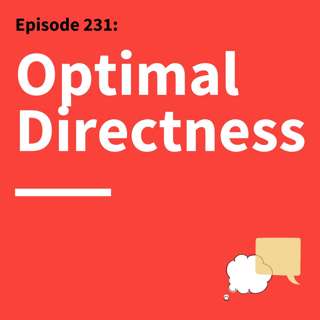
28. Building Strong Relationships: How to Effectively Communicate in Your Professional and Personal Life
Recognizing the importance of forging connections with others — and learning how to build those bonds in real time — is the focus of a course that’s been the most popular elective at Stanford GSB for decades: Interpersonal Dynamics. The iconic course has taught thousands of students and professionals what it means to have exceptional relationships and how to interact with others in a way that contributes to deeper, stronger connections.In this episode of Think Fast, Talk Smart, lecturer and podcast host Matt Abrahams sits down with David Bradford and Carole Robin, lecturer and former lecturer of iconic Stanford GSB class Interpersonal Dynamics to discuss their new book, Connect: Building Exceptional Relationships with Family, Friends, and Colleagues. Both lecturers in leadership, Bradford and Robin outline what they’ve been teaching in the classroom for a broader audience.Connect:Premium Signup >>>> Think Fast Talk Smart PremiumEmail Questions & Feedback >>> hello@fastersmarter.ioEpisode Transcripts >>> Think Fast Talk Smart WebsiteNewsletter Signup + English Language Learning >>> FasterSmarter.ioThink Fast Talk Smart >>> LinkedIn, Instagram, YouTubeMatt Abrahams >>> LinkedIn ********Thank you to our sponsors. These partnerships support the ongoing production of the podcast, allowing us to bring it to you at no cost.Strawberry.me. Get $50 off coaching today at Strawberry.me/smartBecome a Faster Smarter Supporter by joining TFTS Premium.
18 Feb 202130min
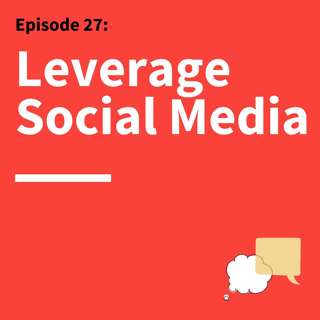
27. Psychology Trumps Technology: How to Be a Better Communicator on Social Media
“Psychology trumps technology,” says Jeff Hancock, founding director of the Stanford Social Media Lab and professor in the Department of Communication at Stanford.“If you want to understand what's going on in social media, the first place to start is with what's going on psychologically.”On the latest episode of Think Fast, Talk Smart, lecturer and podcast host Matt Abrahams sits down with Professor Hancock, to talk about the communication tendencies, styles, and mistakes of social media users. “Whenever there's a new kind of technology ... our focus is on what it's doing,” Professor Hancock says. “But I think over time what we end up realizing is that it's still people using it to accomplish things. And I think when we start to when we step back … we can get a sense of what really is changing.” Connect:Premium Signup >>>> Think Fast Talk Smart PremiumEmail Questions & Feedback >>> hello@fastersmarter.ioEpisode Transcripts >>> Think Fast Talk Smart WebsiteNewsletter Signup + English Language Learning >>> FasterSmarter.ioThink Fast Talk Smart >>> LinkedIn, Instagram, YouTubeMatt Abrahams >>> LinkedIn ********Thank you to our sponsors. These partnerships support the ongoing production of the podcast, allowing us to bring it to you at no cost.Strawberry.me. Get $50 off coaching today at Strawberry.me/smartBecome a Faster Smarter Supporter by joining TFTS Premium.
28 Jan 202127min

26. Writing to Win: How to Quickly Capture Readers and Keep Them Engaged
“The reader is impatient,” says Glenn Kramon, Stanford GSB lecturer in management and editor at the New York Times. “Start with the most important conclusion and then explain how you got there.”On the latest episode of Think Fast, Talk Smart, lecturer and podcast host Matt Abrahams sits down with Glenn Kramon to talk about just how important our writing is — from a lengthy report to the opening line of an email. Listen as they discuss tips on improving your writing skills and share examples of what not to do. Connect:Premium Signup >>>> Think Fast Talk Smart PremiumEmail Questions & Feedback >>> hello@fastersmarter.ioEpisode Transcripts >>> Think Fast Talk Smart WebsiteNewsletter Signup + English Language Learning >>> FasterSmarter.ioThink Fast Talk Smart >>> LinkedIn, Instagram, YouTubeMatt Abrahams >>> LinkedIn ********Thank you to our sponsors. These partnerships support the ongoing production of the podcast, allowing us to bring it to you at no cost.Strawberry.me. Get $50 off coaching today at Strawberry.me/smartBecome a Faster Smarter Supporter by joining TFTS Premium.
8 Jan 202124min

25. Quick Thinks: All Effective Communication Must Start With This
As we look back on more than 20 interviews with Think Fast, Talk Smart guests, we’ve heard one piece of advice over and again: Know Your Audience. This wisdom echoes what research clearly shows: Content that is relevant and meaningful to an audience is more likely to be heard, retained and acted upon. The word communication comes from the Latin for to “make common,” yet many of us start our message from the wrong place. As lecturer and podcast host Matt Abrahams shares in this Quick Thinks episode, by taking the time to learn about our audience and their needs, we can better craft our messages for them and be more useful, engaging and successful.Connect:Premium Signup >>>> Think Fast Talk Smart PremiumEmail Questions & Feedback >>> hello@fastersmarter.ioEpisode Transcripts >>> Think Fast Talk Smart WebsiteNewsletter Signup + English Language Learning >>> FasterSmarter.ioThink Fast Talk Smart >>> LinkedIn, Instagram, YouTubeMatt Abrahams >>> LinkedIn ********Thank you to our sponsors. These partnerships support the ongoing production of the podcast, allowing us to bring it to you at no cost.Strawberry.me. Get $50 off coaching today at Strawberry.me/smartBecome a Faster Smarter Supporter by joining TFTS Premium.
4 Dec 20208min
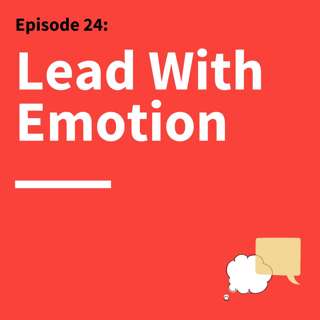
24. Feelings First: How Emotion Shapes Our Communication, Decisions, and Experiences
“Something like 90 to 95% of our decisions and behaviors are constantly being shaped the non-consciously by emotional brain system.” In this episode of Think Fast, Talk Smart, Professor of Marketing Baba Shiv sits down with lecturer and host Matt Abrahams to share his research on how emotions affect our, and our audience’s, decision making. “You’ve got to pay careful attention to the audience that you’re talking to and allow the person to talk,” Shiv says. “Allow the person to talk because then, the person has ownership of the idea.” Connect:Premium Signup >>>> Think Fast Talk Smart PremiumEmail Questions & Feedback >>> hello@fastersmarter.ioEpisode Transcripts >>> Think Fast Talk Smart WebsiteNewsletter Signup + English Language Learning >>> FasterSmarter.ioThink Fast Talk Smart >>> LinkedIn, Instagram, YouTubeMatt Abrahams >>> LinkedIn ********Thank you to our sponsors. These partnerships support the ongoing production of the podcast, allowing us to bring it to you at no cost.Strawberry.me. Get $50 off coaching today at Strawberry.me/smartBecome a Faster Smarter Supporter by joining TFTS Premium.
20 Nov 202025min

23. Look Within: How to Lead with Self Awareness and Vulnerability
“Effective is being able to achieve your goals, which is important, but there are plenty of people who achieve their goals that most of us would find unworthy. So the question what does it take to be a good leader requires you to reflect on the values that you hold dear.”In this episode of Think Fast, Talk Smart, Senior Associate Dean and Professor of Organizational Behavior Brian Lowery sits down with lecturer and host Matt Abrahams to discuss the importance of self inquiry and an examination of one's own values in order to be effectively communicate and lead. “Society is not designed, really, to evoke deep thought about the fault lines in the broader community," Lowery says. "That’s not something that is going to be presented to you. It’s something that you have to look for and pay attention to.”Connect:Premium Signup >>>> Think Fast Talk Smart PremiumEmail Questions & Feedback >>> hello@fastersmarter.ioEpisode Transcripts >>> Think Fast Talk Smart WebsiteNewsletter Signup + English Language Learning >>> FasterSmarter.ioThink Fast Talk Smart >>> LinkedIn, Instagram, YouTubeMatt Abrahams >>> LinkedIn ********Thank you to our sponsors. These partnerships support the ongoing production of the podcast, allowing us to bring it to you at no cost.Strawberry.me. Get $50 off coaching today at Strawberry.me/smartBecome a Faster Smarter Supporter by joining TFTS Premium.
6 Nov 202032min
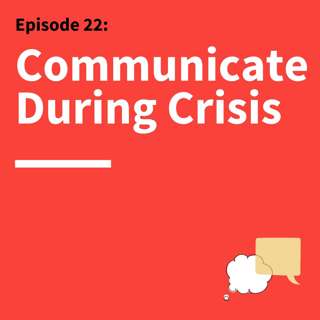
22. Under Pressure: How to Communicate Clearly and Timely During a Crisis
“Knowing your values gives you a beacon, or a lamppost, that can inform how you’re going to prioritize your actions.” In this episode of Think Fast, Talk Smart, Stanford Graduate School of Business lecturer and Stanford University’s former Vice President of Public Affairs David Demarest speaks with host and lecturer Matt Abrahams on why knowing your values and the concerns of your stakeholders lays the foundation for any communication during a time of crisis.Connect:Premium Signup >>>> Think Fast Talk Smart PremiumEmail Questions & Feedback >>> hello@fastersmarter.ioEpisode Transcripts >>> Think Fast Talk Smart WebsiteNewsletter Signup + English Language Learning >>> FasterSmarter.ioThink Fast Talk Smart >>> LinkedIn, Instagram, YouTubeMatt Abrahams >>> LinkedIn ********Thank you to our sponsors. These partnerships support the ongoing production of the podcast, allowing us to bring it to you at no cost.Strawberry.me. Get $50 off coaching today at Strawberry.me/smartBecome a Faster Smarter Supporter by joining TFTS Premium.
22 Okt 202027min
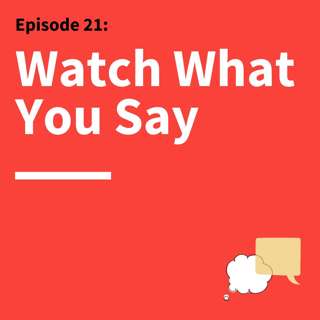
21. Words Matter: How to Make Your Communication Inclusive
What way can the language we use reinforce existing stereotypes and biases? In this episode of Think Fast, Talk Smart, Sarah Soule, Senior Associate Dean and Professor of Organizational Behavior sits down with lecturer and host Matt Abrahams to discuss how even the details of our word choice can shape culture, for better or worse. Connect:Premium Signup >>>> Think Fast Talk Smart PremiumEmail Questions & Feedback >>> hello@fastersmarter.ioEpisode Transcripts >>> Think Fast Talk Smart WebsiteNewsletter Signup + English Language Learning >>> FasterSmarter.ioThink Fast Talk Smart >>> LinkedIn, Instagram, YouTubeMatt Abrahams >>> LinkedIn ********Thank you to our sponsors. These partnerships support the ongoing production of the podcast, allowing us to bring it to you at no cost.Strawberry.me. Get $50 off coaching today at Strawberry.me/smartBecome a Faster Smarter Supporter by joining TFTS Premium.
9 Okt 202023min
